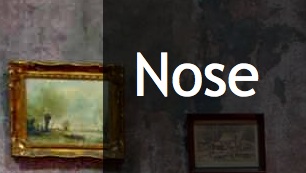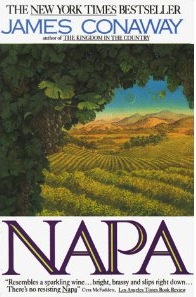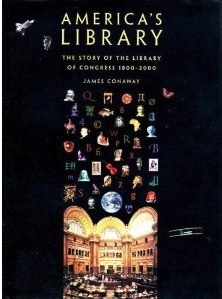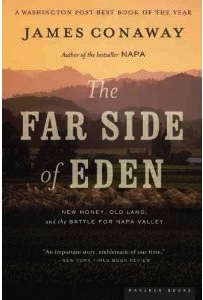A Writer Takes on Wine: The James Conaway Interview
 Writer and author James Conaway helped me get my first job in the wine industry. It was his 1990 expose of the Napa wine industry, "Napa", that I wrote a review of and put in my portfolio to show potential employers that I could write decently. I don't owe James a percentage of my wages earned since 1990, but I do owe him my gratitude for writing a fascinating and illuminating book that I could sink my teeth into as a reviewer.
Writer and author James Conaway helped me get my first job in the wine industry. It was his 1990 expose of the Napa wine industry, "Napa", that I wrote a review of and put in my portfolio to show potential employers that I could write decently. I don't owe James a percentage of my wages earned since 1990, but I do owe him my gratitude for writing a fascinating and illuminating book that I could sink my teeth into as a reviewer.
Since the publishing of "Napa" in 1990, an event that put Conaway on the best sellers list and brought him a certain amount of condemnation from the industry for telling secrets and training a journalist's eye on the industry, he has gone on to edit magazines, write more books on fascinating subjects, engage in fiction and even return to the subject of the wine industry with his 2002 "The Far Side of Eden", for which he earned a Washington Post "best book of the year" recognition and about which the New York Times wrote, ""an important story, emblematic of our time."
Conaway is set to return to an examination of the wine industry, but this time in the form of a novel. Early next year Thomas Dunne Books, an imprint of St. Martin's Press, will publish Conaway's "The Language of Cabernet". This will not be his first foray back into the world of wine since pissing off the Napa establishment with the 2002 "The Far Side of Eden". He has continued to pen articles on wine in a variety of formats including his work for National Geographic. More importantly, in January Conaway began writing a wine blog he simply entitles: "NOSE". As one would expect, it's a very good read.
Conaway was kind enough to engage with me for an interview in which he discusses is past works on wine,  his upcoming novel, wine blogging and wine writing, and the nature of creativity.
his upcoming novel, wine blogging and wine writing, and the nature of creativity.
Tom Wark (TW): If not "muckraking", then your 1990 book "Napa" and the follow up "The Far Side of Eden", could be classified as exposes of Napa and Northern California Wine Country. If I recall you took a great deal of flack for your approach in both these works. What was the initial motivation for both books and how would you describe the fall out and response to them, particularly from the industry?
James Conaway (JC): I was working for the Washington Post and taking one day a week to write the wine column. I travelled to NoCal, primarily Napa, and quickly saw that it was a genuine sub-culture. Grapes and wine influenced all levels of society and provided a lot of the money and impetus for keeping valley beautiful and financially healthy and free of development. I had just finished a book about public lands the American West – The Kingdom in the Country – and saw that Napa was another way to look at land use, as well as a place with a fascinating human history. As successful and famous as Napa Valley was, no one had written a book about what had happened there – primarily, I think, because wine writers weren’t up to the kind of reporting that would take, and journalists who were up to it were somewhat intimidated by the subject of wine. So I jumped in and soon realized this was a great story that took 800-plus pages of manuscript to tell.
 TW: Next year you will release a novel, "The Language of Cabernet", that is set in northern California and revolves around the wine industry. It's a return to the novel format for you and a return to the wine industry as a subject matter. What prompted you to once again explore the culture of the wine industry and to do so in a fiction format?
TW: Next year you will release a novel, "The Language of Cabernet", that is set in northern California and revolves around the wine industry. It's a return to the novel format for you and a return to the wine industry as a subject matter. What prompted you to once again explore the culture of the wine industry and to do so in a fiction format?
JC:I learned a lot about people involved in the upper echelons of wine while researching both Napa and The Far Side of Eden. I couldn’t help, being a novelist, too, envisioning over the years different situations involving human conflict that often arise in the wine business and how various vital issues might play out in an imaginary setting. With a novel the author has total control (as opposed to journalism) and can follow inspiration, not facts, as a free, unhampered agent. I also saw the humor involved in the careers of well-known critics, their – let’s admit it –bizarre profession and its unique pressures that could provide a keyhole through which a reader sees the interior dramas of a unique and fascinating world.
TW: In your view, what most important elements of a good piece of fiction? Story? Strong characters? Strong message? Good writing? And can you say a little about the process of "inspiration" as it applies to your work in the fiction genre? Is the inspiration for a story something that comes over time or tends to come at once?
JC: The most important thing is the characters, who if strong and fully realized will carry the message you have in mind without its having to be labored. Yes, good writing’s important and in fact part of the creation of a character, meaning fully realized scenes, tight exposition and an absence of cliché. I guess I’d put imagination up there too, since you have to see these things unfolding and have the discipline to sit there and get them down while the inspiration’s on you. In my experience you have to grab it as soon as it arrives.
 TW: You've written books on the Library of Congress as well as the Smithsonian. What is your relationship with these kinds of venerable institutions that would motivate you to write about them?
TW: You've written books on the Library of Congress as well as the Smithsonian. What is your relationship with these kinds of venerable institutions that would motivate you to write about them?
JC: Those are two of Washington’s indisputably great institutions. I was asked by the Smithsonian to write a kind of biography for its 150th anniversary that would be illustrated from the archives, with a lot of editorial assistance. I lived in D.C. and thought it well worth doing. A couple of years later the Library, which had its 200th looming, asked me to do the same thing, and again I agreed. I was writing other books at the time – a memoir, Memphis Afternoons and, later, starting a novel based on my experiences in California wine country. The books about the Smithsonian and the Library were different sorts of projects and posed no conflicts except for the time required.
TW: The Smithsonian and the Library of Congress seem to be extensive and extraordinary catalogues of our culture. In writing your two works on these institutions and through your work with Preservation, you must have given some considerable thought to the idea of culture and particularly American Culture. I'm wondering, what are your thoughts on how wine in particular fits into the unique American culture?
JC: Wine is in its way a rich reflection of American culture, starting with agriculture and ending, as so much does in this country, as a sign of either enlightened land use, or the opposite. Wine also plays into the class argument, too often used as an indication of wealth and success, when it could as easily be viewed as an accouterment of everyday life and a means of celebration and enhanced enjoyment of life.
TW: Can you say a bit about the trajectory of your career as a writer and the important milestones  along the way?
along the way?
JC: A Wallace Stegner fellowship at Stanford University was hugely important, not so much for what I learned there about writing but for getting me away from home and into the world. Working as a starting reporter (without journalistic experience) on the Times-Picayune in New Orleans was important because it taught me how the real world worked. Traveling and living in Europe, where I worked for the Rome Daily America, also helped. Though I started out writing fiction journalism soon became a powerful attraction because it was so interesting and could take you to places you would never see as a novelist. So I tried to move back and forth between the genres and had some success. Working at the Washington Post upped the ante in every way, and I got into wine in a way that wouldn’t have been possible without it. Then when "Napa" made it onto the New York Times best-seller list I got a definite boost. Then, as editor of Preservation magazine in Washington, I saw from the inside how big philanthropic institutions function and are influenced, and that was instructive for any novelist. All the while I was interested in fiction, and in the natural world, to which wine belongs.
TW: I think many people might wonder what the impact is on the writer of having a book attain the level of success that gets it on to the NY Times Best Sellers list. What was your experience?
JW: There’s noting quite like hitting it, something writers don’t often experience and a lift both professionally and personally. But the thing I learned is that success doesn’t last and that re-invention’s always necessary. As a writer you have to keep re-imagining yourself in relation to your craft, and you have to keep working – sometimes the hardest part.
TW: Have you observed the development of the wine blogging world and if so, what are your thoughts on its import and impact?
JC: I’m new to wine blogging but think it’s important as an alternative to most of what appears in print. There are good, regular wine critics for publications all over, but many aren’t really writers, and they have an establishment bias even when not aware of it, and bloggers can offer an alternative. Often wine writers don’t question practices and products as pointedly as they should. Some critics, despite introducing thousands to wine and helping the more knowledgeable with choices, are too close to the industry. The point system is one result. Though convenient, it has had a baleful influence generally by reducing wine to numbers and providing often fanciful rankings and pretentious descriptions. Wine bloggers can let it all hang out. This makes the subject – and the substance – more interesting and leaves room for broader criticism, which the wine world needs.
TW: You have certain criticisms of the wine writing genre and wine critics. Can you give me your idea of how the model wine writer/critic would approach their subject?
JC: I’ve always thought that wine’s a good way to look at the world and the country, a keyhole into a sub-culture with all the ramifications of American life, and fun besides. I think many wine writers could give more time to considering the social and environmental questions inherent in the rise of wine, and the integrity required to make and sell wine in a way that contributes to the overall health of the land and the people living on it.
——————-
James Conaway's Blog, NOSE
James Conaway's Amazon Page
A selection of James Conaway's work for National Geographic
Photo above of James Conaway by Peter Menzel

Great to meet James Conaway this way Tom. Thank you for spotlighting the writers out there like this.
NOSE? Bookmarked. The wide context and the breadth of perspective is a welcome wind in our sails.
Tom — you didn’t ask the most important question about Jim’s new novel…who should run and hide?
harvey
Harvey,
Without giving away too much, I believe its the wine media that may need to take cover.
Boy can write can’t he?
No doubt he is really a good writer and I love his books.